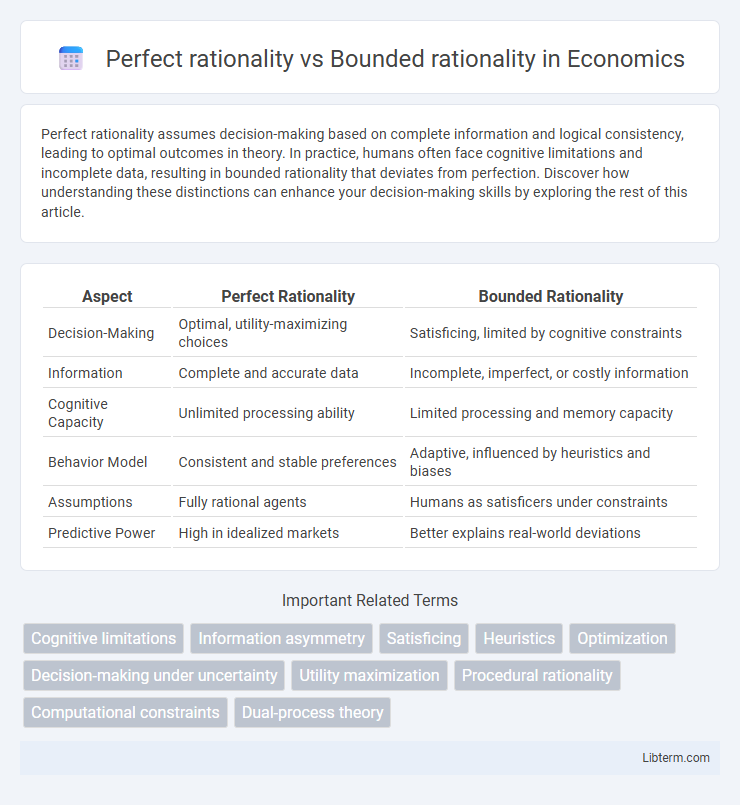Perfect rationality assumes decision-making based on complete information and logical consistency, leading to optimal outcomes in theory. In practice, humans often face cognitive limitations and incomplete data, resulting in bounded rationality that deviates from perfection. Discover how understanding these distinctions can enhance your decision-making skills by exploring the rest of this article.
Table of Comparison
| Aspect | Perfect Rationality | Bounded Rationality |
|---|---|---|
| Decision-Making | Optimal, utility-maximizing choices | Satisficing, limited by cognitive constraints |
| Information | Complete and accurate data | Incomplete, imperfect, or costly information |
| Cognitive Capacity | Unlimited processing ability | Limited processing and memory capacity |
| Behavior Model | Consistent and stable preferences | Adaptive, influenced by heuristics and biases |
| Assumptions | Fully rational agents | Humans as satisficers under constraints |
| Predictive Power | High in idealized markets | Better explains real-world deviations |
Introduction to Rationality in Decision-Making
Perfect rationality assumes decision-makers have unlimited cognitive resources and access to all relevant information, enabling them to optimize outcomes flawlessly. Bounded rationality recognizes human cognitive limitations and incomplete information, leading individuals to satisfice rather than maximize when making decisions. Understanding these concepts is crucial for modeling realistic decision-making processes in economics, psychology, and artificial intelligence.
Defining Perfect Rationality
Perfect rationality refers to a decision-making model where individuals possess complete information, unlimited cognitive processing abilities, and consistently choose the optimal solution to maximize utility. This concept assumes agents can evaluate every possible outcome without error or bias, leading to perfectly logical and optimal decisions. Unlike bounded rationality, perfect rationality ignores cognitive limitations and real-world constraints in human decision-making.
Understanding Bounded Rationality
Bounded rationality describes decision-making limitations caused by cognitive constraints, incomplete information, and time restrictions, challenging the traditional perfect rationality model that assumes unlimited processing ability and access to data. In real-world scenarios, individuals often rely on heuristics and satisficing--seeking acceptable solutions rather than optimal ones--due to these bounded capabilities. Recognizing bounded rationality enhances the analysis of economic behavior and organizational decision processes by incorporating realistic cognitive and environmental factors.
Historical Evolution of Rationality Theories
The historical evolution of rationality theories traces the shift from classical economics' assumption of perfect rationality, which posited that individuals consistently make optimal decisions by processing all available information, to the introduction of bounded rationality by Herbert Simon in the mid-20th century, highlighting cognitive limitations and environmental constraints. This paradigm shift integrated insights from psychology and behavioral economics, emphasizing satisficing behavior over utility maximization. The development of bounded rationality revolutionized decision theory by acknowledging human cognitive biases, limited information processing capacity, and the influence of real-world complexities on decision-making processes.
Key Differences Between Perfect and Bounded Rationality
Perfect rationality assumes individuals have unlimited cognitive resources and access to all relevant information, enabling them to make optimal decisions. Bounded rationality recognizes cognitive limitations and incomplete information, leading individuals to satisfice rather than optimize. Key differences include the scope of information processing, decision-making speed, and the realism of assumptions about human cognitive capabilities.
Real-World Implications of Bounded Rationality
Bounded rationality acknowledges human cognitive limitations and incomplete information, leading to decision-making that is satisfactory rather than optimal in real-world scenarios. This perspective explains behaviors in economics, marketing, and organizational management where individuals rely on heuristics and satisficing instead of exhaustive analysis. Recognizing bounded rationality improves policy design, user experience, and strategic planning by accommodating realistic human constraints.
Limitations of Perfect Rationality Models
Perfect rationality models often face limitations due to their assumption that decision-makers have unlimited cognitive resources and access to all relevant information, which is rarely realistic in real-world scenarios. These models fail to account for human cognitive biases, time constraints, and incomplete knowledge, leading to decisions that deviate from purely rational outcomes. Bounded rationality offers a more practical framework by recognizing these cognitive limitations and emphasizing satisficing behavior over optimal solutions.
Cognitive Biases and Information Constraints
Perfect rationality assumes decision-makers have unlimited cognitive resources and access to complete information, enabling optimal choices. Bounded rationality recognizes cognitive biases such as anchoring, confirmation bias, and availability heuristic, which distort judgment and limit rational decision-making. Information constraints further restrict decision accuracy by introducing incomplete, ambiguous, or costly data, compelling individuals to satisfice rather than optimize.
Applications in Economics, Psychology, and AI
Perfect rationality assumes decision-makers optimize utility with complete information and unlimited cognitive capacity, serving as a benchmark in classical economics for modeling ideal market behavior. Bounded rationality acknowledges cognitive limitations and incomplete information, leading to satisficing rather than optimizing decisions, which better explains real-world human behavior in psychology and informs heuristic-based algorithms in artificial intelligence. Applications in economics utilize bounded rationality to model consumer behavior and market anomalies, psychology explores decision-making under uncertainty, and AI leverages these concepts to design adaptive systems that mimic human problem-solving efficiently.
Future Perspectives on Rational Decision-Making
Future perspectives on rational decision-making emphasize the integration of perfect rationality models with bounded rationality to better reflect real-world complexities. Advances in artificial intelligence and cognitive modeling aim to enhance decision processes by accounting for limited information, cognitive constraints, and time pressures. Emerging research explores adaptive strategies that balance computational optimization with heuristic approaches to improve predictive accuracy and practical applicability in dynamic environments.
Perfect rationality Infographic

 libterm.com
libterm.com